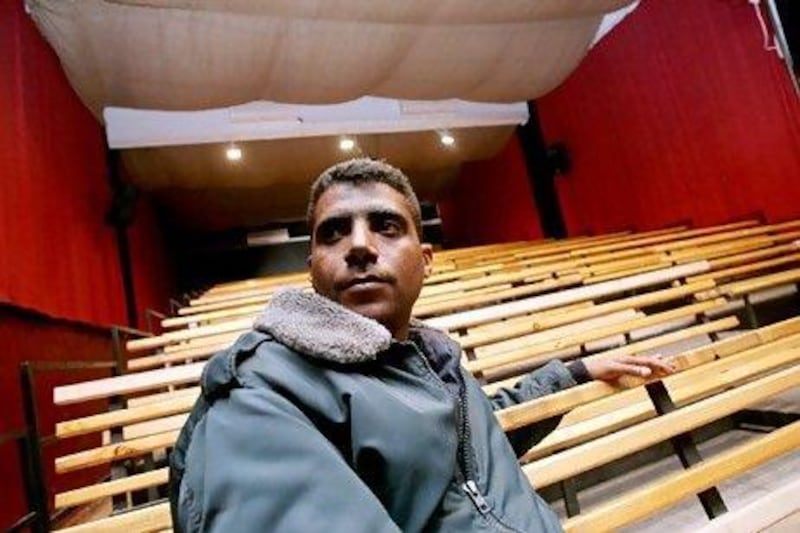JENIN, WEST BANK // Six years ago, a fierce Palestinian fighter laid down his weapons and helped found a liberal performing-arts theatre in Jenin's conservative refugee camp.
It was a remarkable turnaround for Zacharia Zubeidi, who fought for Fatah's Al Aqsa Martyrs' Brigades during the second intifada, to exchange violence for what he called cultural resistance against Israel's occupation of the Palestinian territories.
Mr Zubeidi once was an almost untouchable figure in the gritty camp. Palestinian leaders envied the power he wielded over residents and Israeli soldiers feared his determination to fight them before he gave up armed struggle to manage the theatre.
But since May, Mr Zubeidi has languished in custody of the Fatah-led Palestinian Authority (PA), detained in connection with an attack on a Palestinian official. He has not been formally charged with a crime, which has infuriated his supporters who decry his detention as a miscarriage of justice.
When asked about Mr Zubeidi, Talal Dwekat, the governor of the Jenin governorate said: "The point of what we're doing is to try to deliver security, stability and rule of law to Jenin."
That effort began after the May 1 shooting attack on the residence of Qadoura Mousa, then governor of Jenin, who consequently died of a heart attack.
Palestinian security forces responded with a sweeping campaign of arrests in the camp and in surrounding villages. On May 13, they came for Mr Zubeidi.
Mr Dwekat declined to comment in detail on the investigation. But he said investigators discovered that a local commander of one of the PA's security agencies ordered the attack on Mousa's home and that by the time Mr Zubeidi was detained, the weapon was in his possession.
"We're trying to determine whether he knew the weapon had been used in the attack," said Mr Dwekat.
Mr Zubeidi's family and lawyer, for their part, do not dispute that he had been in possession of the firearm after the attack.
Although denying he knew it was used in the attack, their accounts differ about what Mr Zubeidi did after obtaining the weapon, described as an assault rifle.
His 38-year-old brother, Abed, said an accomplice in Mousa's attack hid the weapon at a building that the Zubeidi family had rented out to a 23-year-old camp resident.
Mr Zubeidi had the weapon for several days after agreeing to take it off the resident's hands because, Abed said, "he did not want this young guy to be in possession of such a dangerous weapon".
Abed added that after his brother was detained, Mr Zubeidi had agreed to hand the weapon over to the PA.
But Farid Hawwash, Mr Zubeidi's lawyer, said Zacharia had notified the PA of the weapon and agreed to deliver it to authorities but then security personnel, in a surprise move, detained him.
Mr Zubeidi, 36, has had a life that has been far from easy. He fought some of the fiercest battles of the uprising against Israel, which began in 2000, and suffered great personal loss - Israeli soldiers killed both his mother and a brother.
He abandoned violence in 2006 and helped found Jenin's Freedom Theatre with an Israeli actor and activist named Juliano Mer-Khamis.
Israel then, in 2008, included Mr Zubeidi in an informal amnesty deal for Palestinian fighters who chose to lay down their weapons.
After Mr Zubeidi was arrested, his family complained that PA authorities tortured him at his prison facility in Jericho, denied him access to a lawyer for two weeks and held him in solitary confinement for about 50 days.
PA officials have dithered over whether to formally charge Mr Zubeidi, who has threatened to refuse food and water in protest. Interrogators have focused on asking him to identify the location of arms caches in the camp, said his lawyer, Mr Hawwash. They also suspect Mr Zubeidi of hoarding his own.
Mr Hawwash said he thought his client possessed arms, but only "as a way to honour" fallen fighters from the intifada.
In December, Israel revoked Mr Zubeidi's amnesty by placing him back on the country's list of wanted militants. It occurred several months after an unidentified gunman assassinated Mer-Khamis, the theatre's co-founder, inside the camp, but Israel gave no reason why it put Mr Zubeidi back on the wanted list.
Supporters and rights groups have called on the PA to either charge Mr Zubeidi with a crime or set him free.
"I'm not saying Zacharia is not guilty - maybe he is!" said Jonatan Stanczak, the Freedom Theatre's managing director. "But whether he's Zacharia Zubeidi or somebody else, he should be treated fairly under the law."
“But whether he’s Zacharia Zubeidi or somebody else, he should be treated fairly under the law.”
Camp residents have considered staging demonstrations to protest against Mr Zubeidi’s detention.
“There is hatred of the PA in this camp,” said Shami Shami, a Fatah member and representative of Jenin in the Palestinian legislative council. He said a sense of neglect by Palestinian authorities had intensified anger over recent PA incursions into the camp. Earlier this month, Hisham Al Rakh, a local PA security commander, was assassinated there.
Officials discovered afterwards that the suspect in his murder had rocket-propelled grenades, ammunition and bulletproof vests stored at his home, the unofficial Palestinian news agency Maan reported this month.
That anger may also be linked with Mr Zubeidi, described by Mr Shami as “the most respected figure” in the camp. “The people know the PA is exploiting Zacharia’s detention as a way to intimidate the camp,” he said.
hnaylor@thenational.ae





